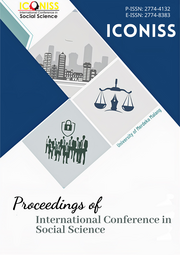Criminal Policy Concerning Imposition of Criminal Sanctions Against Child Performers
DOI:
https://doi.org/10.26905/iconiss.v3i1.9699Keywords:
Criminal policy, Perpetrators of child abuseAbstract
Child abuse is a form of crime. The Criminal Code classifies the crime of obscenity as a crime of decency. The Penal Code itself has not clearly defined the meaning of obscenity and seems to confuse its meaning with rape or sexual intercourse. The specific protection of children's rights as part of human rights is contained in Article 28B paragraph (2), according to which "every child has the right to survive, to grow up and to develop and to be protected against violence and discrimination". The protection of children in a nation's society is a measure of the nation's civilization, so it must be pursued in accordance with the capabilities of the homeland and the nation. Safeguarding activities is a legal act that has legal consequences. Therefore, legal guarantees are needed for child protection activities. Its relation to the criminal offense of sexual immorality towards same-sex minors is regulated by Article 292 of the Criminal Code (KUHP). Article 292 of the Criminal Code states that “any person of sufficient age who commits an obscene act with another person of the same sex who is known or has reasonable grounds to suspect who is not of sufficient age shall be liable to a maximum sentence of five years. The policy of the judge in child abuse cases must take into account the psychological and psychological aspects of the victim in order to lead to a decision capable of bringing justice to the victim and also to the community. Furthermore, by imposing a severe decision or in accordance with what the perpetrator of the obscenity has done, it will deter the perpetrator and deter other pedophiles from committing the crime of obscenity since the punishment they will receive will be quite strict and has fatal consequences for their next life.
Downloads
References
Ali, M. (2008). Kejahatan korporasi kajian relevansi sanksi tindakan bagi penanggulangan kejahatan korporasi. Yogyakarta: Arti Bumi Intaran.
Ali, Z. (2009). Metode penelitian hukum. Jakarta: Sinar Grafika.
Djami , M. N. (2013). Anak bukan untuk dihukum. Jakarta: Sinar Grafika.
Hamzah, A. (2014). KUHP dan KUHAP. Jakarta: Rineka Cipta.
Iyas, A. (2012). Asas-asas hukum pidana. Yogyakarta: Rangkang Education Yogyakalrta.
Kitab Undang-Undang Hukum Pidana.
Nashriana. (2012). Perlindungan hukum pidana bagi anak di Indonesia. Jakarta: PT . Raja Grafindo Persada.
Pandapotan, D. (2019). Analisis penegakan hukum tindak pidana pencabulan terhadap anak di bawah umur (Studi di Unit Ppa Polrestabes Medan) [Thesis, University of Medan].
Sambas, N. (2013). Peradilan pidana anak di Indonesia dan instrument internasional perlindungan anak serta penerapannya. Yogyakarta: Graha Ilmu.
Santoso, T. (2019). Seksualiatas dan hukum pidana. Jakarta: Ind-Hill Co,1997.
Sembiring, L. P. (2018). Perlindungan hukum terhadap anak sebagai pelaku tindak pidana pencabulan (Studi kasus putusan nomor 79/Pid.Sus-Anak/2015/PN-Mdn) [Thesis, University of Medan].
Undang-Undang Nomor 23 Tahun 2003 tentang Perlindungan Anak, sebagaimana beberapa kali diubah, terakhir diubah dengan Undang-Undang Nomor 17 Tahun 2016.
Yulia, R. (2013). Viktimologi perlindungan hukum terhadap korban kejahatan. Yogyakarta: Graha Ilmu.
Downloads
Published
Issue
Section
License
Authors who publish in this journal agree to the following terms:
(1)Â Copyright of the published articles will be transferred to the journal as the publisher of the manuscripts. Therefore, the author confirms that the copyright has been managed by the journal.
(2) Publisher of Proceedings of International Conference in Social Science is the University of Merdeka Malang.
(3) The copyright follows Creative Commons Attribution–ShareAlike License (CC BY SA): This license allows to Share — copy and redistribute the material in any medium or format, Adapt — remix, transform, and build upon the material, for any purpose, even commercially.

